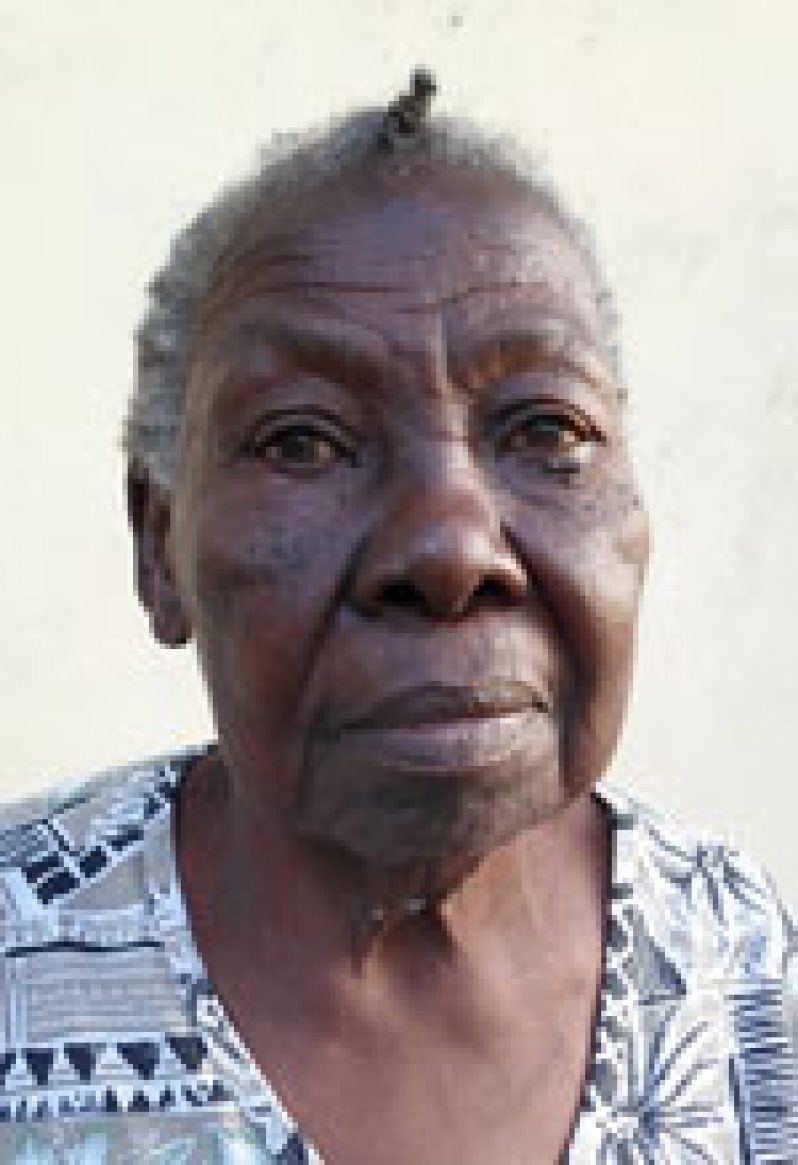MELISSA Hinds, popularly known as ‘Auntie Mel’, who celebrated her 81st birthday Wednesday, is perhaps the third oldest person living at Farm, a village on the East Bank Essequibo.
| ‘The people really lived nice, like one family; and as children, you couldn’t do anything ‘out of the way’ or wrong in front of ‘big-people’; they would give you a spanking, even if is on the road. And when you get home, yuh parents give you the rest!’ |
This village was the last to have been purchased by the freed Africans, who pooled their monies to collectively purchase that plot of land from their former slave masters in  1877.
1877.
Proud to have lived to see yet another milestone, the blithe and winsome octogenarian, who has mothered one child in her lifetime – a son — incredibly can recall exactly what hour on what day she was born.
In reflective mode as she chatted with the Sunday Pepperpot earlier this week, Auntie Mel proudly announced, “I was born on Tuesday, the 19th of July, 1932 at 12:00 o’clock; and so next Wednesday (July 19) I will be 81 years old.
Asked how she came by that valuable bit of information, she said, “My grandmother told me so.”
The second child for her mother, Auntie Mel refers to herself as “the second grandchild born in my grandmother’s home,” which accounts for why she spent the greater part of her childhood with her grandma.
Mother’s passing
She distinctly remembers that her mother, who was hypertensive, had been warned by her doctor that if she ever got a fit, she would die; otherwise, she could expect to live a long time.
But moments after her elder sister got her baby — a boy — their mother’s blood pressure soared, and she passed away.
She recalled, “I was sleeping, and my mother touched me and said, ‘Thank God ah get to see this one! Is a boy!”
Always an independent and resourceful person. Auntie Mel said, “Ah wuk fuh meh money and mind mesself, cause ah don’t like tek words from people,” she said, meaning that she didn’t like to be beholden to anyone, as they always tend to “throw it in your face”.
It was for that reason, she said, she postponed getting married until she was getting on in years; and even then, an elder aunt still had to talk her into it. Thankfully, it was to that union that she owes the birth of her son. “My sister, she got seven. Yuh see, she scraven; but God give me one, and I thankful,”
Auntie Mel said, a mischievous glint in her eye.
Now living with her son and his family, Auntie Mel said she was born at Wakenaam, but her parents soon moved to Farm Village, where she lives to this day. “The people really lived nice, like one family; and as children, you couldn’t do anything ‘out of the way’ or wrong in front of ‘big-people’; they would give you a spanking, even if is on the road. And when you get home, yuh parents give you the rest!”
Strange ritual
One thing she vividly remembers was the death of an old woman the villagers called “Gan-gan (grand-grand) Tuss”, the oldest woman of African descent living at Farm at the time. And the reason the incident has stuck with her is because the woman was buried in a black coffin, as she was the oldest African in the village.
It was the only time she had ever seen a black coffin. Asked how old the woman was at the time of her death, Auntie Mel replied, “Well, you couldn’t ask old people their age in those days, or they’d tell you yuh playing big woman. You can’t know their age, let alone how they died.”
Other experiences she shared included how the African descendants celebrated Emancipation in the village, in that they met in an open plot of land outside of the first church built there, the Presybterian Church.
For this special occasion, villagers would prepare and serve African dishes, including foo-foo (in those days, a staple served with stew), cook-up rice, pone, konkie, and beverages such as mauby and ginger beer; but it was always a grand time. There would be loud singing of African songs, accompanied by the beating of African drums and story-telling.
Today, however, such goings-on have been watered down. But Auntie Mel hopes that with the African Cultural and Development Association (ACDA) choosing Farm as the Emancipation Village this year, it would serve as a catalyst in bringing about a rebirth of Africanism in the village.



.jpg)











